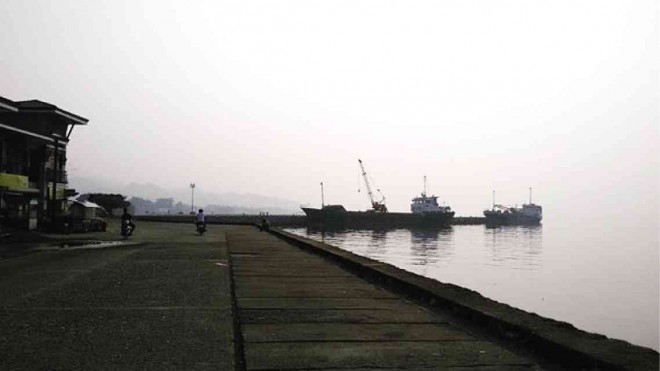
HAZE has reached Maasin City, making its port barely visible from a distance of less than a kilometer.
JANI ARNAIZ/INQUIRER VISAYAS
TAGBILARAN CITY, Bohol—Anita Dacaldacal, 46, woke up to haze-filled skies on Saturday.
From her house in Tagbilaran, she could hardly see Panglao Island nearby which used to be like a painting that greets her every morning.
“The air was very smoky. I can’t see Panglao Island,” said Dacaldacal.
Neighboring Cebu Island, which used to be visible from Tagbilaran, was also covered with thick smoke.
The haze did not spare the mountains of Maribojoc town.
Leonardo Samar, officer in charge of the Philippine Atmospheric Geophysical and Astronomical Services Administration Bohol station, said the haze in the province came from forest fires in Indonesia.
He said Typhoon “Lando” (international name: Koppu), which recently battered central Luzon, helped bring the haze to the country.
Around 8 a.m. on Saturday, Samar said the thick haze had spread all over Bohol, which limited visibility to about 7 kilometers instead of the usual 14 km.
Samar said there was nothing to worry about because the haze is still tolerable.
It, however, triggered cancellation of flights on Saturday due to poor visibility.
As of 2 p.m., at least 450 passengers were stranded at the Tagbilaran Airport after Air Philippines/PAL Express, Cebu Pacific and AirAsia canceled their Manila-Tagbilaran and Tagbilaran-Manila flights because of the haze.
“We have canceled our flights today since it was difficult for pilots to land and take off with very poor visibility,” said Karen Batuhinay, Cebu Pacific operations manager.
In Cebu, the air was found to contain “high particulates” that can be risky for those who have heart and respiratory illnesses.
William Cunado, Department of Environment and Natural Resources director of Environment Management Bureau (EMB) in Central Visayas, said the haze covering Metro Cebu is a mixture of smoke from forest fires in Indonesia and local pollutants.
It is expected to linger in the next few days because there is barely any wind to blow it away and because there is no rain, he added.
Results of air quality tests which EMB conducted on Friday showed that haze particulates in Metro Cebu have become a lot denser than last month’s.
EMB employees did the tests in the cities of Talisay, Cebu and Mandaue.
Cunado said Friday’s testing showed that the presence of air particulate already exceeded the normal 150 micrograms per cubic meter standard. Particulate content in the air was only 50 to 60 micrograms per cubic meter last month.
Cunado said while haze does not have lethal contents, its high particulate content is unsafe especially for those with heart and respiratory ailments.
Small particles of less than 10 micrometers in diameter “pose the greatest problems because they can get deep into the lungs, and some may even get into the bloodstream.”